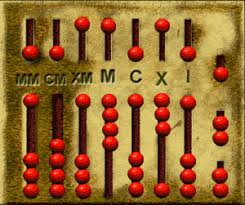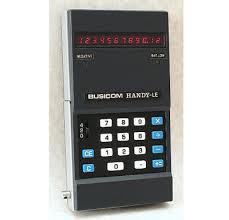Calculation or Computation - That is the Question
November 3, 2017
Elementary Calculation
 The deliberate process known as calculation transforms one or more data sets into one or more results, with variable change. In the beginning, calculation was a simple arithmetical process. Early calculation used small stones as counters. Simply by adding or removing the appropriate number of stones, one could easily calculate everything from inventory of possessions to the cost of buying and selling goods. As calculation became more complex, stone counters gave way to counting boards. The more advanced counting boards developed in ancient Rome and Greece had grooved columns that were labeled by the place each number held. M = thousands, C = hundreds, X = tens, I = ones.
The deliberate process known as calculation transforms one or more data sets into one or more results, with variable change. In the beginning, calculation was a simple arithmetical process. Early calculation used small stones as counters. Simply by adding or removing the appropriate number of stones, one could easily calculate everything from inventory of possessions to the cost of buying and selling goods. As calculation became more complex, stone counters gave way to counting boards. The more advanced counting boards developed in ancient Rome and Greece had grooved columns that were labeled by the place each number held. M = thousands, C = hundreds, X = tens, I = ones.
 In approximately 500 BC, the abacus was invented. Still in limited use today, the abacus lost popularity when the first slide rule was developed in the 1600’s. This device, in various forms, was widely used until the early 1970’s when the first pocket calculator arrived on the scene and rendered it obsolete.
In approximately 500 BC, the abacus was invented. Still in limited use today, the abacus lost popularity when the first slide rule was developed in the 1600’s. This device, in various forms, was widely used until the early 1970’s when the first pocket calculator arrived on the scene and rendered it obsolete.
Reality Calculation
 Arithmetical calculation achieved using an algorithm is the most familiar type of calculation for many. This form of mathematics is the study of numbers and the properties of traditional operations between them. These include addition, subtraction, multiplication, and division. Arithmetical calculation, along with algebra, geometry, and analysis, comprise what is known as “number theory.” Number theory, itself, is the top-level platform of modern mathematics.
Arithmetical calculation achieved using an algorithm is the most familiar type of calculation for many. This form of mathematics is the study of numbers and the properties of traditional operations between them. These include addition, subtraction, multiplication, and division. Arithmetical calculation, along with algebra, geometry, and analysis, comprise what is known as “number theory.” Number theory, itself, is the top-level platform of modern mathematics.
Not all calculation, however, is as straight forward as the Arithmetical calculation. A rather vague model called Heuristics takes calculation in a whole different direction. This approach to problem solving uses practical methods which are not definitive or even optimal, but are designed to be sufficient to reach the immediate stated goal. Heuristic calculation produces ranges of possibilities rather than exact answers. Examples include the rule of thumb, guesstimation, intuitive judgement, profiling, and common sense. This form of calculation is often used when formulating a competition strategy or determining the chances of successful personal relationships, in statistical estimations like election results or opinion polls, or in complex hedging strategies like those used by investment banks and hedge fund managers. Heuristic calculation can also be applied to learning or discovery.
The Calculation/Computation Question
Given all of the above information, is calculation the same as computation? Sort of, but not exactly. While calculation is a prerequisite component of computation, some differences exist. Actually, computation is defined as any type of calculation that includes both arithmetical and non-arithmetical steps and follows a defined model, for example, an algorithm. The primary difference is in the functionality of a calculator vs a computer. Both devices are capable of rapid mathematical calculation, however, the calculator is limited to numbers calculation, can only complete one task at a time, and is dependent upon input provided throughout the process. The computer, by comparison, can be programmed to multi-task and complete entire complex calculations without assistance. That being said, do you calculate or do you compute?
If you are finding more and more often that your calculations simply do not compute, perhaps it’s time for some new technology. Before investing in a new, high-tech replacement, however, put your old calculator out to pasture at SellYourCalculators.com. Our buy-back program for used calculators offers competitive prices, quick turn-around time, and outstanding customer service. Let us help you calculate the financial benefits today. Contact us for more information.
44566 Views | 0 Comments | Category - news





